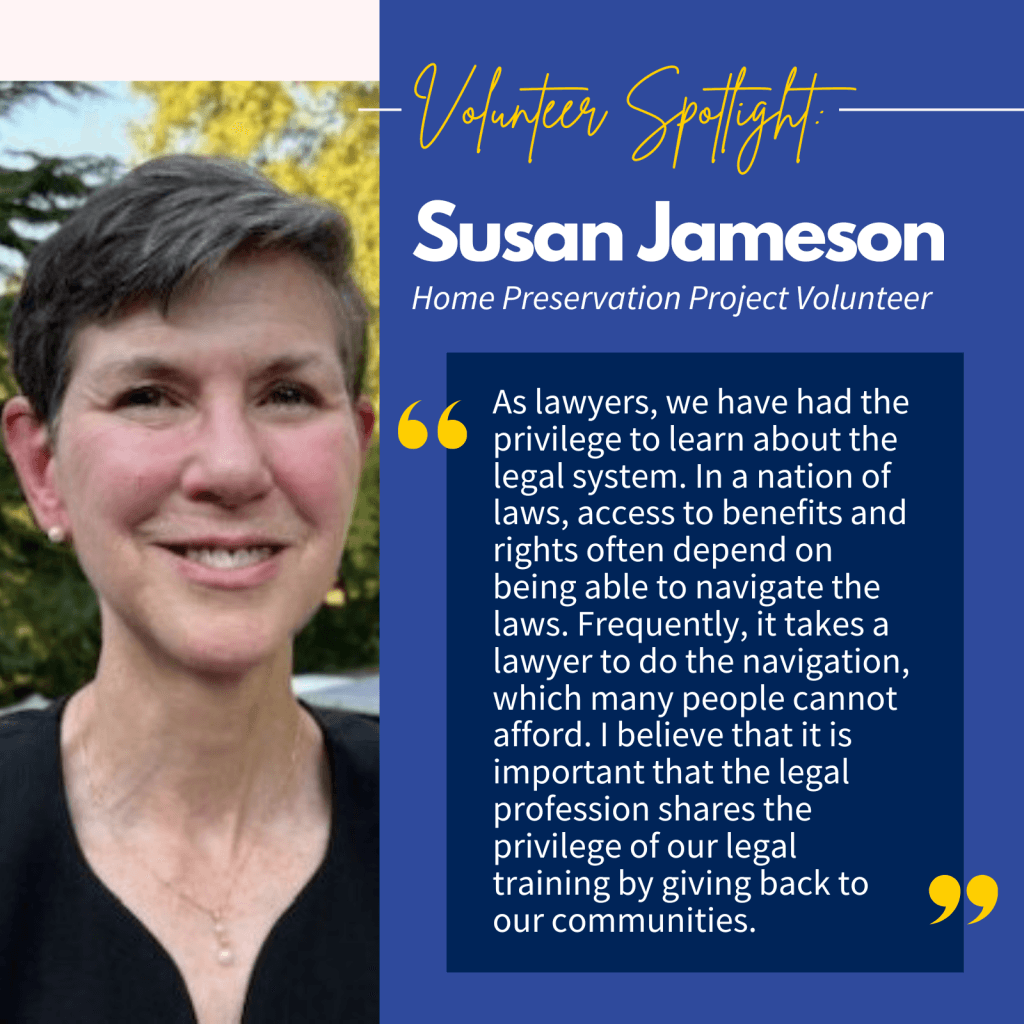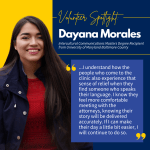Volunteer Profile: Susan Jameson

1. What brought you to begin your legal career in Maryland?
My legal career actually began in a large firm in New York City and, after that, I practiced in two other states before I relocated to Maryland. The answer the question is that my husband and I decided to consolidate our life together in one state, Maryland.
2. Can you tell me a little about your work/private practice?
I started my practice in a large firm in New York City where I practiced employment law, employee benefits and general litigation. I relocated to Hawaii where I worked for a short time in a small general practice before joining a mid-size firm where I was a partner and practiced employment law and general litigation. I relocated to New Jersey to work as in-house employment counsel for an international publicly traded financial services company based in New York and New Jersey. Finally, I relocated to Maryland and accepted a position with CareFirst practicing employment law.
3. Which of PBRC’s projects do you volunteer with, and how did you get involved?
For PBRC, I volunteer with the Housing Preservation Project, at its Estate Planning Clinics. While I was still with CareFirst, I volunteered for estate planning clinics organized by various pro bono organizations in the Baltimore area. When I retired from CareFirst, I wanted to do pro bono work, and the Housing Preservation Project’s Estate Planning Clinics seemed like a good fit for me.
I also volunteer with PBRC partners, the Homeless Persons Representation Project and Senior Legal Services. Through the Homeless Persons Representation Project, I represent expungement petitioners, and through Senior Legal Services, I handle simple estate planning matters, similar to the work at the PBRC Estate Planning Clinics.
4. What is the problem this project addresses, and what do you do as a volunteer to help?
The goal of the Housing Preservation Project is to keep people in their homes. Estate planning is an important way that homeowners can preserve their wealth, including the equity in the home. Planning for the transfer of a home in a will supports the efficient transfer of the property and minimizes the chances that the equity in the home will be dissipated by unpaid bills and/or disputes about ownership. Financial powers of attorney can help avert the potential loss of a home by ensuring that homeowners’ mortgages, bills and taxes will be paid if the homeowner becomes incapable of handling his or her financial affairs.
5. What do you find interesting about this work?
The clients, their lives, their priorities and their interests are so varied. It is infinitely interesting to me the way people make decisions about what is important to them as they consider the decisions that go into wills, powers of attorney and medical advance directives. My interactions with the clients are rich with stories about lives and experiences different from my own.
6. What, if anything, did you find surprising about volunteering at community clinics or in-court? What has been rewarding? What, if anything, has been frustrating?
It is extremely rewarding to work face-to-face with clients who, as a general matter, do not have access to affordable legal services and to be able to deliver to these clients a finished product, on the spot, at the clinic. It is not uncommon for people to postpone preparing and executing estate planning documents because the prospect of the task weighs on them. The Estate Planning Clinic clients are grateful to be able to leave with a finished product in just a few hours; quite a few clients have given me a hug of appreciation and gratitude.
7. How does the project make it easy to volunteer?
PBRC makes it very easy to volunteer. PBRC provides training on the particular area of law and legal process. There are regular emails seeking volunteers for the clinics as well as reminders. The PBRC staff sets up the clinic, complete with laptop computers, printers/copiers and office supplies. PBRC attorneys are on-site to answer questions and provide additional guidance. And, they even provide lunch. The only thing that the volunteers need to do is show up, engage with the clients and practice law.
8. Is there a particular moment or memory that stands out for you?
As volunteers at the Estate Planning Clinics, we do not have an ongoing relationship with the clients because we produce finished and executed estate planning documents for the clients at the clinic. Consequently, there is no one client who stands out in my mind. The memories that I have are of the gratitude and relief expressed by so many of the clients: their feelings of satisfaction that they have taken care of their loved ones, planned for their potential incapacity and provided for the disposition of their assets.
9. How has doing pro bono work changed you?
Pro bono work has made me more empathetic. Through pro bono work, I have the opportunity and privilege to engage with clients who have backgrounds and experiences different from mine. For the most part, for many of us, our interpersonal interactions, even when diverse, are
with people with whom we share something in common, whether the workplace, a school, a faith community or a hobby. The clients of the Home Preservation Project introduce and teach me about experiences vastly different from my own.
10. How important do you think pro bono work is to the legal profession?
Pro bono legal work is important to the legal profession for a number of reasons. Pro bono clients can teach us so much about diverse experiences and situations. Also, pro bono work provides another context in which to practice our skills, including listening, synthesizing information and analyzing the facts and the law. Most of all, pro bono work gives us the opportunity to engage and help fellow human beings.
As lawyers, we have had the privilege to learn about the legal system. In a nation of laws, access to benefits and rights often depend on being able to navigate the laws. Frequently, it takes a lawyer to do the navigation, which many people cannot afford. I believe that it is important that the legal profession shares the privilege of our legal training by giving back to our communities.
11. What message would you give to attorneys thinking about volunteering?
It’s fun, it’s rewarding, it takes you out of your work routine; you will learn from the legal work, and you will learn even more from your clients.
For more information about volunteering in Maryland, please contact: education@probonomd.org







